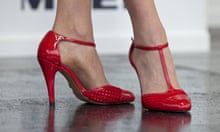Women are belittled and face the sack if they complain about sexist dress codes, such as wearing revealing clothing and high heels all day, MPs have heard.
One MP described how her daughter was left with a fractured foot after being made to wear heels in a retail job. Speaking during a debate on Wednesday in parliament on workplace dress codes, Labour’s Gill Furniss said her daughter suffered a metatarsal fracture “more commonly affiliated with sports injuries”.
She said: “Quite literally adding insult to injury, she was denied any compensation or sick pay as she wasn’t on the payroll for long enough. Needless to say, she did not return to this type of work, but not everyone has that choice.”
The MP for Sheffield, Brightside and Hillsborough added that standing in high heels for a period of an eight-hour shift was the norm in some professions. “Wearing heels in this way often causes foot pain, bunions, skin lesions, lower-limb pathology and other related discomforts for the heel-wearer.”
The Westminster Hall debate heard other women had been told to wear more revealing clothing in an effort to sell to male customers, while others had been told to bleach their hair blond and make sure their lipstick was the same shade as their colleagues’. Many, she said, had no choice but to comply if they wanted to stay in employment.
“It is fair to say that what we found shocked us. We found attitudes that belonged more – I was going to say in the 1950s but probably the 1850s might be more accurate, than in the 21st century,” said Labour MP Helen Jones, the chair of parliament’s petitions committee, which organised the debate.
“Threatened with dismissal if they complained, they were forced to bear pain all day, or to wear clothing that was totally unsuitable for the tasks that they were asked to perform, or to dress in a way that they felt sexualised their appearance and was demeaning.”
The debate followed a petition signed by more than 150,000 people, which was launched by receptionist Nicola Thorp after she was sent home from work when she refused to wear high heels.
The parliamentary petitions and women and equalities committees were moved to investigate sexist work dress codes as a result. They subsequently called for a review of equality legislation.
The shadow equalities minister, Paula Sherriff, said the introduction of hefty employment tribunal fees had stopped many women from seeking recourse through the courts.
The equalities minister, Caroline Dinenage, called on all employers to review their dress codes to reform any offices still retaining a “dodgy 1970s workplace diktat”. She said the government “utterly condemns such dress requirements where their effects are discriminatory”.







